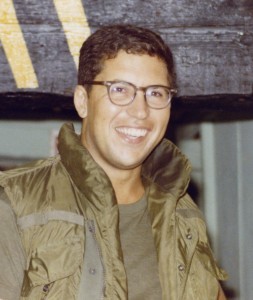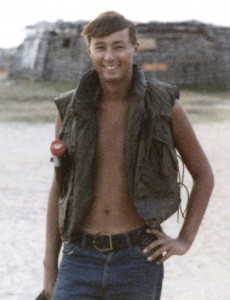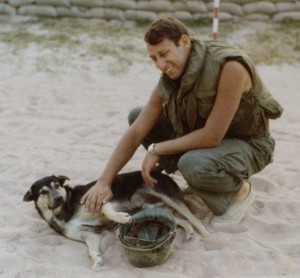Jon Varat – Fire Direction Officer – Part Two
Vietnam
I flew to Vietnam in July of 1970 on one of those charter airlines, I think Flying Tiger. The stewardesses as we called them in those days were older women with lots of experience, because these were prime assignments. If you flew to Vietnam and back that was pretty much your whole month’s work. They were very nice. We started in San Francisco, flew to Anchorage – saw lots of snow. Then to Kyoto, Japan – looked outside the plane and saw lots and lots of cars. At none of these places did we get off the plane. Then to Vietnam. I am looking down at this very green country and seeing smoke rising from different parts of thick jungle. I thought, This is the war, maybe artillery fire or planes dropping bombs. What the hell have I gotten myself into?
And then it was into Long Binh. I reported to the officer replacement camp at Long Binh, which was one of the worst places I’ve ever been in my life. The place was smelly, hot and awful. I thought: Oh my god, if this is the officer replacement facility, the rest of Vietnam is going to be really bad. It actually turned out to be the worst place of all in my entire tour in terms of physical comforts.
From Long Binh they sent me to Nha Trang, and then to Dalat to meet Lt. Colonel Tuck, the Group Artillery Commander. The bachelor officers quarters was an old French villa, now fit out with an abundance of sandbags and covered with Army ponchos where the place leaked. It had its own little charm. Dalat city was also quite pretty. At one time it was a mountain resort for Madam Nhu.
The glamorous Madame Nhu, also known as the Dragon Lady, was married to the brother and chief adviser to President Diệm. She was the de facto First Lady of South Vietnam from 1955 to 1963.
Then I got sent down to battalion headquarters at Phan Rang. You’re sent down these various steps until you get your final assignment. I’m a second lieutenant in a line of new officers. The Vietnamese tailors had sewn artillery patches on my uniform that had crossed cannons. But the crossed cannons were very small, so they looked like crossed rifles. The guy in charge of replacement asked me to come forward because he thought I was an infantry officer and he wanted the infantry officers in the first rank. I had to point out to him that these were cannons, not rifles.
Sherry
I thought I was going to end up being a forward observer, which was a little scary. I had heard that of the last twelve forward observers in our battalion, nine had been killed. That did not seem good. I was greatly relieved to be assigned to B Battery at LZ Sherry.
I helicoptered in on September 7, 1970. My one impression was that for a fixed firebase it seemed less primitive than I was expecting. It had a cement basketball court, and the hooches made of sandbags and ammunition boxes seemed not shockingly bad. I was welcomed by Joe DeFrancisco, the battery commander, and Bob Christenson, the Fire Direction Officer. I was assigned to be the full time motor officer, and part-time fire direction officer, with the idea I would eventually become the full time FDO after Bob.
 Captain Joe DeFrancisco
Captain Joe DeFrancisco
 1st Lt. Bob Christenson
1st Lt. Bob Christenson
I also had the job of walking around the perimeter between midnight and three in the morning checking on the tower guards. I thought all this was something I could handle. When my perimeter shift ended I remember going back to FDC and playing bridge when things were quiet. At five o’clock I’d go to sleep till eight or so, and then get up and do the motor officer thing during the day, and on occasion play a little basketball. I wrote in a letter home early in my tour that I liked the casual atmosphere at Sherry better than any other place I had been in the Army. That would hold true for my entire tour.
 Making a friend
Making a friend
Eyes and Ears
I understood that our biggest threat was not a frontal assault, because we had twin 40 mm Dusters and Quad-50 emplacements on the perimeter. But we had to worry about sapper attacks, somebody sneaking through the wire during the night, on one of those nights when one of the local kids on their water buffaloes, supposedly tending their rice paddies, had somehow managed to put rubber bands around our trip flares. It was very important for the people in the towers to be awake and vigilant. I understood that the enemy was not going to tell us what night they were going to sneak in. The old saying was true that you had to be correct 100% of the time, whereas they only had to be right 1%.
Watching for the enemy
It was getting way too easy for people to come up to the barbed wire, put rubber bands around our trip flares or disconnect our Claymore mines and make us vulnerable to sappers. Security wise we would be a hell of a lot better off if we could clear another fifty yards out. If no one is supposed to be there, it would be easier to see them rather than letting the rice paddy work abut the barbed wire. We had a lot of trouble with local Vietnamese officials about clearing more space around our perimeter, but eventually got permission.
A bulldozer comes out to do the job. It takes a few days, and one of those days the bulldozer guys come in to have lunch. One of our guys is up in one of the towers and reports to me that he noticed somebody was walking by the front of the bulldozer. We go out there and find a Chinese anti-tank mine in front of the bulldozer. It is clearly Chinese because of the writing on it and the red star on the thing. Because of the keenness of our guy in the tower we avoided disaster. That’s your eyes and ears being more important than technology.
Watching the other guy too
We had some guys who were from the hills of Tennessee. They were nice young guys, who were not very sophisticated. Then we had some guys from the inner cities. One night when I was still responsible for the perimeter towers, one of these kids from Tennessee – and they were kids just eighteen, nineteen years old, while I was twenty-five – came down from the tower to talk to me. He was unhappy and scared because the other guy in the tower with him, from the city, was smoking pot and getting high. He was afraid this guy couldn’t do his job, and that it was dangerous. He did not want to be in the tower with someone who was high as a kite. We ended up giving the guy an Article 15, because you had to have some discipline. These were the guys who were supposed to be protecting us, and I was not prepared to fool around with the safety of a hundred other people. We had a lot of perimeter technology such as radar and various ground sensor equipment. The alertness of guys in the tower was more important: eyes and ears.
You Can Tell A Man By His Books
We got boxes of books all the time from Special Services. I would let the guys get their books first, because they took all the stuff I was not interested in anyway. Then I took all the history and philosophy books.
The books on Jon’s shelf were not likely to be fought over. They testify to a mind starved for stimulation of almost any kind, a mind carried to a neighborhood far from his Ivy League law school, to a world away from the premier LA law firm of O’Melveny & Myers, and to an entirely different universe from the professional companionship of Warren Christopher.
 Jon’s Desk, the Venus de Milo looking on
Jon’s Desk, the Venus de Milo looking on
A sample of Jon’s books:
The Magic Barrel by Bernard Malamud
Darkness at Noon by Arthur Koestler
War Between Russia and China, by Harrison E. Salisbury
My Life With Martin Luther King, Jr., by Coretta Scott King
The Czech Black Book by Robert Littell
The Death of Ivan Ilych by Leo Tolstoy
America The Raped by Gene Marine
Prime Time: The Life of Edward R. Murrow by Alexander Kendrick
Three Short Novels by Fyodor Dostoyevsky
No Easy Victories by John Gardner
Prejudice and Race Relations by Raymond W. MacK
Yom Kipur
I want to give credit to the Army that it was always good about trying to accommodate people’s religious beliefs. By then I was not that religious a person, but I was raised in the Jewish faith by my pretty religious mother. I wrote to her in October, about a month after arriving at Sherry, that I was able to get to a few hours of services on Yom Kipur at Cam Ranh Bay. That was important to my mother. The colonel sent a helicopter out to Sherry to pick me up. The Army was very good about that sort of thing.



